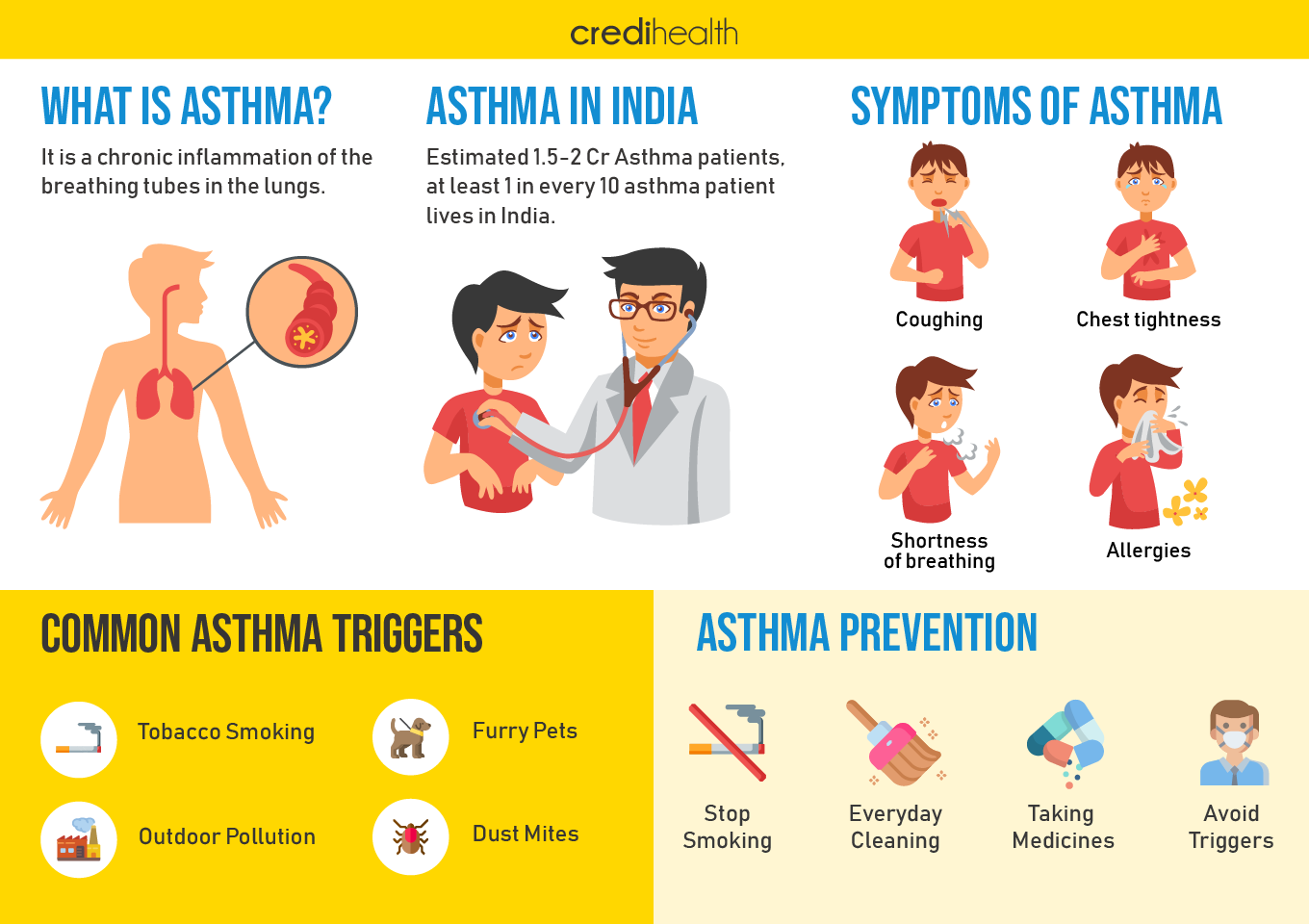According to the World Health Organization (WHO), nearly 15-20 million Indians suffer from asthma. Despite the increasing numbers of asthmatics, the discussion and knowledge about Asthma causes and risk factors remain underrated in the country. Let's talk about the complex disease and remove the guesswork.

What is Asthma? Should you be concerned?
Asthma (also known as bronchial asthma) is a chronic respiratory disease in which a person's airways inside the lungs become narrow and swell. The airways turn red due to the disease and grow extra sensitive to certain triggers from the environment. When faced with such triggers, the airways swell even more and secrete large amounts of mucus. This condition makes it difficult for a person to breathe and triggers coughing, wheezing, and breathlessness.
What are the different types of Asthma?
Asthma is classified into specific types based on how or when it is induced in a person. It is beneficial for you to understand the specific type of ailment, and to follow its treatment correctly.
- Child-onset Asthma
- Adult-onset Asthma
- Allergy Asthma
- Exercise-induced Asthma
- Cough-variant Asthma
- Occupational Asthma
- Night-time Asthma
This disease has varying effects on its patients. The diverse symptoms and risk factors of Asthma make it complicated for understanding.
What causes Asthma?
The exact causes of Asthma cannot be identified by medical science, yet. However, it is known for a fact that both genetics and environmental factors play a role in its development. The following list of factors can be ruled out as causes of Asthma:
- Genes: A person whose parents suffer from Asthma is more likely to develop this disease compared to a person whose parents do not. This disease can be inherited by children and thus, it tends to run in families.
- Allergies: Since every person responds differently to irritants or allergens, the symptoms of asthma differ. Dust, air pollutants, pollen, paints, pet dander, etc. could cause irritation in the airways and make a person vulnerable to an asthma attack. Repeated or continued exposure to the allergen is believed to aggravate the condition.
- Viral Respiratory infections: Respiratory infections like the common cold can cause lung tissue inflammation and even damage. The lung function of a person can be impaired in the long run if he/she has suffered these infections in early childhood.
- Environmental factors: Airborne substances such as pollen, dust, secondhand smoke, etc. can trigger asthma attacks. The chances of developing this disease are higher for a person living in urban areas (because of continuous exposure of airborne substances).
Asthma Causes And Risk Factors
Knowing possible risk factors that trigger Asthma attacks can be a starting point to talk to the doctor about. There are several reasons or risk factors that predispose you to this disease. This predisposition is calculated by the presence or absence of the risk factors that are now known to influence respiratory disease.
1. Family History
A person whose blood relative (a parent or sibling) has Asthma is more likely to develop this disease since genes play an important role in deciding who gets Asthma and who does not.
2. Sex and Age
For reasons unknown, Asthma is found more common among young boys than girls. Medical experts believe that this is due to the small size of the airway in boys. However, this ratio shifts as a person approach adulthood. The male-to-female ratio of asthmatics is almost equal towards adulthood.
3. Allergies
If a person has an allergic condition such as atopic allergies, rhinitis, conjunctivitis, allergies to pet dander, dust mites, etc., he/she may have a higher possibility of developing asthma.
4. Smoke
Smoking or exposure to secondhand cigarette smoke, exhaust fumes, etc. is a high-risk factor for Bronchial Asthma. Studies have shown a link between smoking tobacco and an increase in asthma incidents, especially among young adults.
5. Environmental Factors
Air pollutants, components of smog, cold temperature, and high humidity are some of the many factors that pose a risk for a trigger of an asthma attack.
6. Hyper-Reactive Airways
People with extra-sensitive airways are more prone to develop asthma since more inflammation is caused in their lungs. This hyper-reactivity varies from person to person.
7. Obesity
Studies have recorded a relationship between obesity and asthma. Doctors are unsure of the underlying cause of this relation. An obese person is at a higher risk of developing asthma during his lifetime.
8. Pregnancy-related Risks
Smoking during pregnancy is fatal for the mother and her baby for all the reasons. One of the reasons is the risk of developing asthma in newborns.
What are the tell-tale symptoms of Asthma? How to identify it?
It can be confusing to tell if you have asthma. Not everyone experiences all Asthma symptoms all the time, and they can range from mild to serious. Some of the symptoms highlighted in people with asthma are as below:
- Difficulty in breathing or shortness of breath
- Pain in the chest or tightness/heaviness in the chest
- Excessive coughing (mostly during the night) hinders sleep.
- Wheezing (hissing or heavy sound) when you breathe in and out.
- Extreme difficulty in regaining breath after physical exertion.
What is the treatment for curing Asthma?
- Unfortunately, there is no precise treatment to cure Asthma. Therefore, it is important to control it effectively to avoid severe asthma attacks.
- If you identify your condition with any of the above symptoms or causes, it is recommended to consult a doctor directly and confirm with him/her if you have this disease or not.
- If you are sure that you have asthma, you should work with your doctor to conduct an action plan. This action plan should aim at managing this ailment.
- If your asthma attacks become more frequent, you should review it with your doctor and make the needed adjustments in your action plan.
- Your doctor can prescribe different treatment types and combinations to help control your asthma. This includes inhalers to open up the airways, steroid medications to reduce inflammation, and other oral medications that help reduce airway reactivity.
Life With Asthma
A cliched saying, "Prevention is better than cure" fits the case of Asthma. Since the disease cannot be cured but only be controlled. Educating yourself and society about the causes and understanding the risk factors of Asthma shall help people in the right decision-making and improve their quality of life. Surprisingly, correct prevention can highly alter the condition of Asthma in a person.
Also, read about: Frequently Asked Questions About Asthma AttackSuffering from Asthma? do consult with the Best Pulmonologist in India today or book an appointment with Credihealth.
For more information and free personalized guidance, talk to Credihealth Medical Experts.
Reviewed by







